Key takeaways:
- Privacy advocacy is essential in raising awareness about individual rights and data misuse, empowering people to demand better practices from organizations.
- During crises, personal information is particularly vulnerable, making privacy awareness crucial to prevent exploitation and protect safety.
- Sharing personal stories and fostering community dialogue enhances the impact of privacy advocacy, encouraging collective engagement and understanding.
- Effective advocacy requires adaptability and proactive strategies, including the use of social media to reach a broader audience and reshape societal views on privacy.

Understanding privacy advocacy
Privacy advocacy is fundamentally about protecting individual rights in an increasingly digital world. I remember when I first realized how much of my personal information was floating around online without my consent; it felt like a violation. This experience opened my eyes to the importance of standing up for privacy rights, as many people remain unaware of how their data is being used.
One significant aspect of privacy advocacy is educating others about their rights and the implications of data misuse. I often find myself asking friends, “Do you really know what companies do with your information?” The shocked expressions I see in response tell me that we need to have more of these conversations. Engaging in discussions about data policy and the ethics of information sharing can empower individuals to demand better practices from organizations.
Moreover, privacy advocacy encompasses the ongoing fight for stronger regulations that protect us from surveillance and unauthorized data harvesters. I vividly recall attending a town hall meeting where community members shared their concerns about data privacy; the sense of solidarity was palpable. It made me realize that when we come together, our voices can create impactful change in policy and foster a culture that values personal information as a fundamental right.
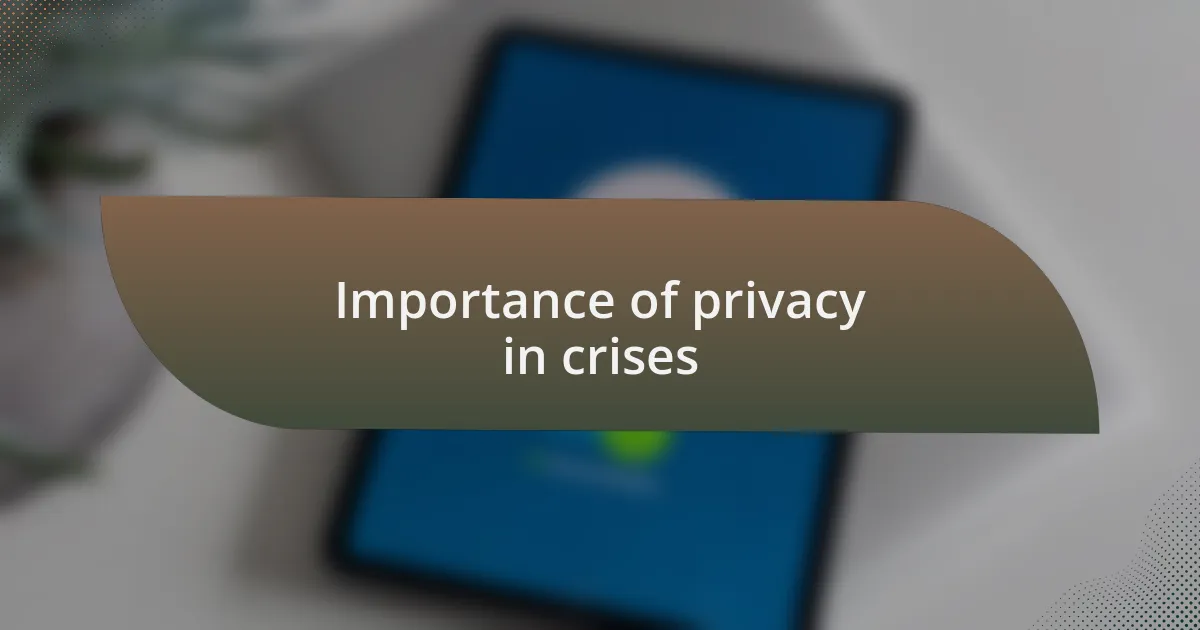
Importance of privacy in crises
Privacy becomes paramount during crises, as personal information is often more vulnerable than ever. I remember a friend frantically searching for information during a natural disaster; he was posting his location on social media without realizing that it could put his safety at risk. This made me reflect on how a lack of awareness about privacy can lead to dire consequences in emergency situations.
In times of chaos, trust is fragile, and people are more likely to share sensitive information out of fear or desperation. I found myself questioning, “How can we balance the need for urgent information with the need for privacy?” It’s a tough dilemma. I’ve noticed that those who are more privacy-conscious are better equipped to navigate crises, as they tend to guard their information while still seeking essential updates from reliable sources.
Additionally, maintaining privacy during crises helps prevent the misuse of personal data by malicious actors. I recall a distressing example where individuals’ data was harvested during a public health emergency, leading to scams targeting vulnerable populations. This experience taught me the importance of advocating for stringent privacy measures, ensuring that our personal data does not become collateral damage in times of turmoil.
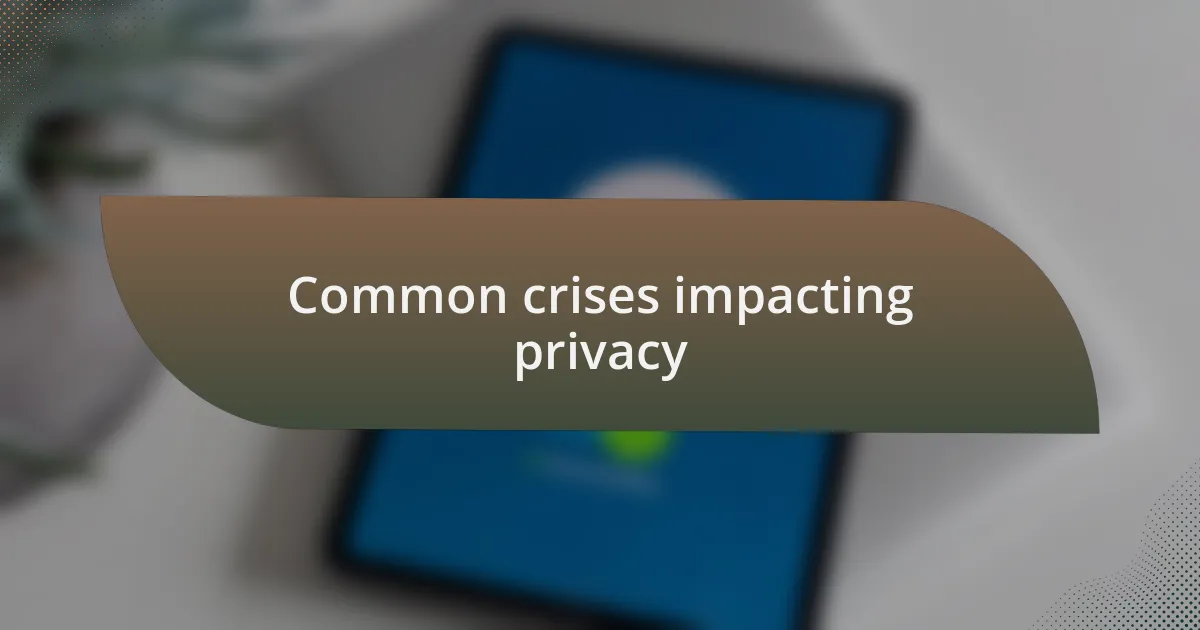
Common crises impacting privacy
Crises often manifest in various forms, including natural disasters, political upheavals, and health emergencies. I recall a tense period during a public health crisis when misinformation spread like wildfire. Friends were sharing unverified claims about medical procedures, which got me thinking about how easy it is for privacy breaches to occur in the scramble for information. How many of us truly consider the implications of sharing sensitive health details online during such times?
Another pressing concern is data leaks during cyber incidents, where attackers exploit chaos to steal personal information. I’ve witnessed firsthand the panic that ensues when sensitive data gets compromised. A colleague once received a notification that her data had been part of a major breach. It was an eye-opener, pushing me to ponder the necessity for constant vigilance even when life feels overwhelming. Why do we let our guard down in moments of stress, knowing the risks?
Finally, there’s the challenge posed by government surveillance during crises, which can infringe on our privacy rights. I remember a time when I felt uneasy about sharing my location data with a certain app that claimed to help track emergencies. The friction between public safety and individual privacy makes you wonder: at what point does the right to privacy get overshadowed by the need for safety? Each crisis presents a unique set of challenges that can impact our personal information if we’re not careful.
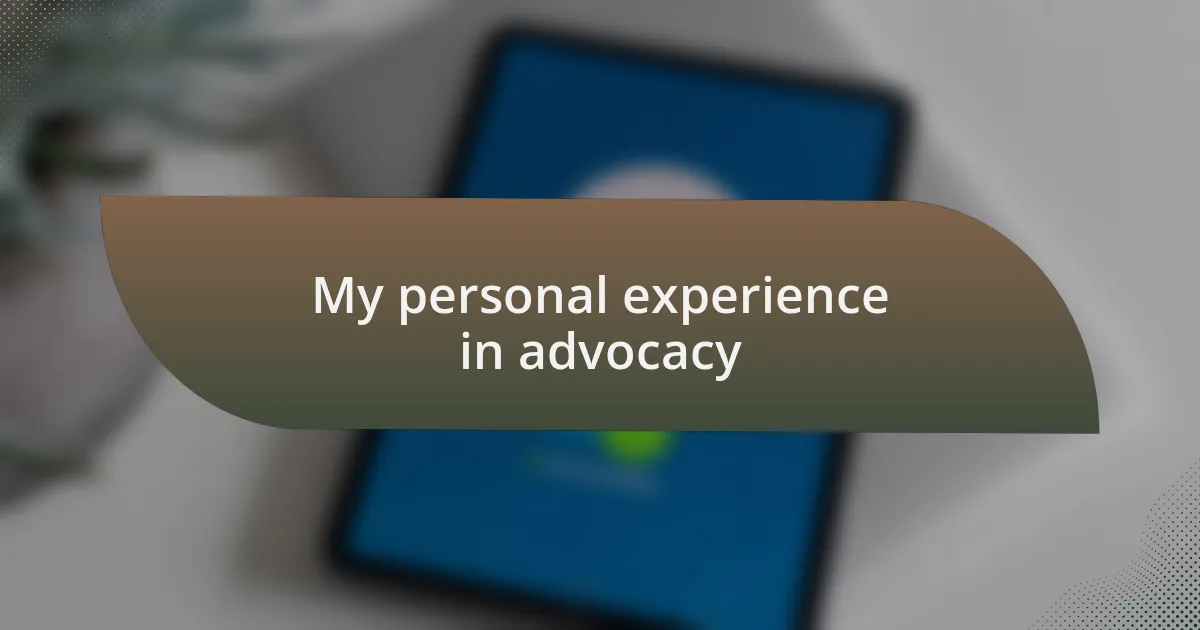
My personal experience in advocacy
Advocacy has been a vital part of my life, especially when I faced a volatile situation where privacy was at stake. I remember standing at a community forum during a recent political protest, where misinformation was rampant. I felt compelled to educate others about their digital rights, sharing how simple steps could protect their privacy. The energy in the room was palpable, and I couldn’t help but wonder, how many people were even aware of their own vulnerabilities in that moment?
One unforgettable experience occurred during a community workshop I led on cybersecurity. As I shared stories about the repercussions of data breaches, I could see the concern on faces, reflecting a sense of urgency. It dawned on me that many felt powerless against the looming threat of privacy invasions, but I also saw sparks of determination to take action. Wouldn’t it be incredible if we all left with a deeper understanding of safeguarding our digital lives?
I’ve also engaged in online advocacy campaigns, using my platform to raise awareness about privacy issues. On one occasion, I posted about the importance of encryption tools, only to receive a flurry of questions and personal experiences from friends. That dialogue made me realize how eager people are to learn, yet often feel lost in the complexity of these topics. Isn’t it fascinating how crisis can transform individual experiences into a collective drive for change?
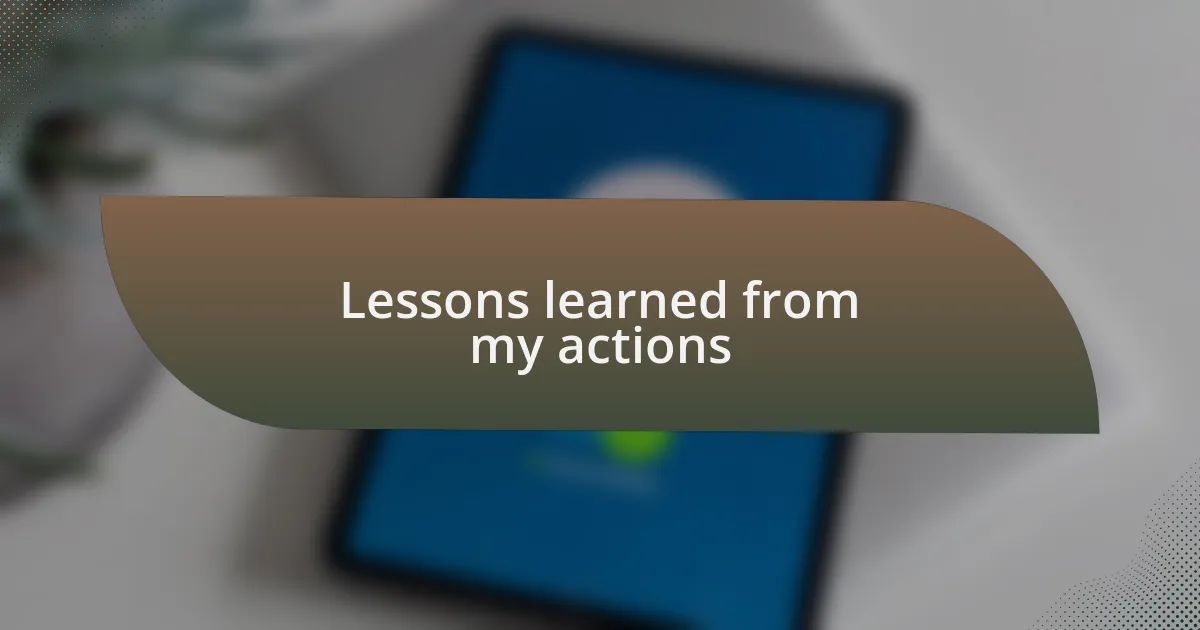
Lessons learned from my actions
In reflecting on my advocacy actions, I learned that communication is paramount during a crisis. In one instance, I joined a local organization focused on protecting digital privacy. When misinformation surged, I saw firsthand how crucial it is to provide clear, accurate information to dispel fears and empower individuals. Wasn’t it enlightening to see how knowledge could light a path through the darkness of confusion?
Another key lesson was the power of sharing personal stories. At a town hall meeting, I recounted my own challenges with data privacy and the anxiety I felt when I discovered my data was exposed. Those moments of vulnerability resonated with attendees, prompting them to share their own experiences. How often do we underestimate the impact of authenticity in driving change?
I also discovered the importance of persistence. During an online campaign, I encountered pushback against privacy initiatives from some who felt it was an overreaction. Instead of shying away, I engaged in respectful discussions and shared more resources. Along the way, I realized that perseverance, even in the face of skepticism, can gradually shift mindsets and foster a community committed to advocacy. Isn’t it amazing how patience can turn doubt into dialogue?
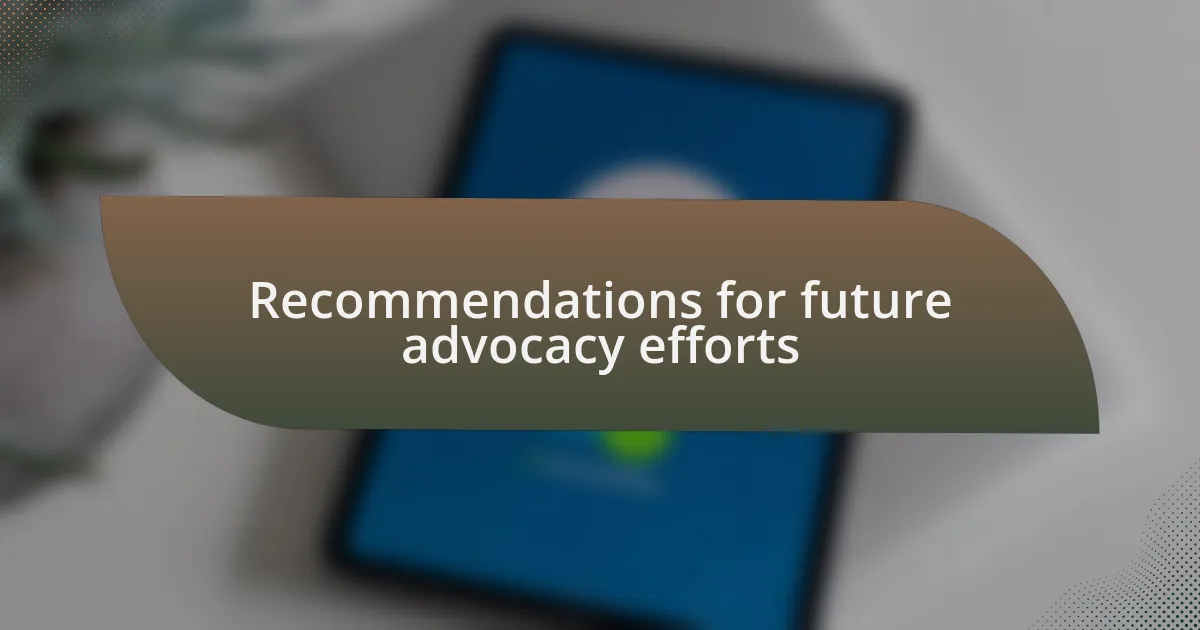
Recommendations for future advocacy efforts
Advocacy in the realm of privacy requires a proactive stance. In my experience, establishing a network of allies who share your goals can amplify the message. I recall collaborating with educators to integrate digital privacy lessons in local schools. The ripple effect was remarkable; students discussed these topics at home, transforming parental attitudes as well. How often do we neglect the power of education in reshaping societal views?
Moreover, leveraging social media platforms effectively cannot be overstated. During a crucial campaign, I utilized various channels to disseminate not just facts but also engaging visuals and personal anecdotes. One particular post about the implications of data theft sparked a conversation that extended beyond my immediate circle. It made me realize the potential of social media to cultivate a community that advocates for privacy rights. Isn’t it fascinating how a single post can ignite widespread dialogue?
Lastly, advocacy must remain adaptable. I learned this when I needed to pivot during a rapidly changing privacy regulation landscape. By staying informed and adjusting our strategies, we were not only reactive but also proactive in addressing new challenges. I often found myself asking, how can we stay one step ahead? This approach deepened my commitment to continuous learning, reinforcing the idea that adaptability is key in effective advocacy efforts.